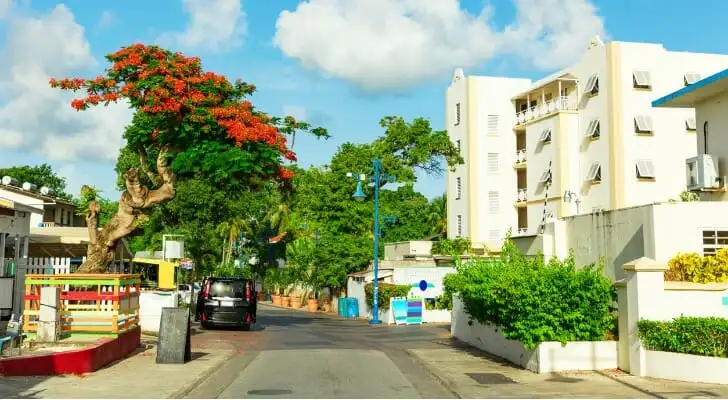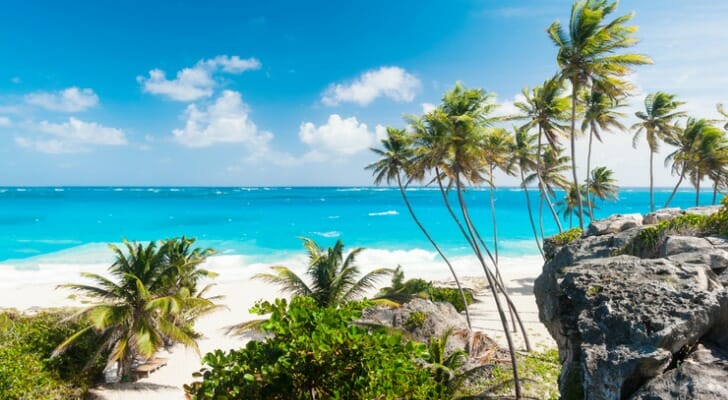An island in the West Indies, Barbados is a jewel of the Caribbean. Its turquoise waters and golden beaches align with many people’s dream of relaxing in the sun after retirement. Barbados, a Commonwealth country where English is the official language, offers plenty — but is it the right retirement spot for you? Before contacting your financial planner to see if your finances are in order for the move, here are a few matters to consider first.
Cost of Living and Housing
Excluding rent, Barbados’s cost of living tends to run a little higher than the U.S.’s on average, according to Numbeo, a cost-of-living database. However, when you include the price of rent, Barbados has a lower cost of living compared to the U.S.
Barbados’s rent is roughly 51% lower than the U.S. Renting a one-bedroom apartment in a city center of Barbados costs about $668. However, purchasing is a different story. An apartment in the same setting typically costs $325 per square foot compared to $300 in the U.S.
So, if you’re looking to stretch your retirement funds further, it makes more sense to rent in Barbados rather than purchase a property.
Retire in Barbados: Visas and Residency Permits
For those who want to retire in Barbados, the process is relatively simple. Individuals over 60 with sufficient funds to support themselves can apply for immigrant status. After living in the country for five years, those people can then apply for permanent residence. Applicants must pay application and approval fees, in this case, $300 and $1,200, respectively.
Another option open to retirees is a special entry and reside permit (SERP). This permit grants long-term residency to qualified applicants, including their spouses and dependents. There are four categories: (1) investors with at least USD $2 million invested in Barbados and a net worth over USD $5 million; (2) property owners with real estate valued at USD $300,000 or more; (3) individuals with skills critical to Barbados’s development; and (4) parents or grandparents of Barbadian citizens, aged 60 or older.
Applicants must submit Form B, pay a USD $150 application fee, provide health insurance over USD $500,000, and supply identity documents. Category 1 fees range from USD $3,500 to $5,000 depending on age. Work permits cost extra. Category 2 permits are issued for five years at USD $5,000 per adult. Dependents pay reduced fees. All investments must come from outside Barbados and be free of encumbrances. Tax residency must also be declared.
Retire in Barbados: Health Care

Barbados has a high standard of living, contributing to strong overall public health. Its health care system is often considered one of the best in the Caribbean. However, if you’re not a Bajan (as citizens of Barbados are sometimes called), you are not included under the island’s universal health care system. Therefore, if you’re an expat looking to retire in Barbados, you should ensure that you have private health insurance. Otherwise, numerous travelers and potential residents seek out the U.S. for treatment instead.
This outsourcing is also partially due to the difficulty in accessing professional care, such as rehab services. Otherwise, you’ll generally find four types of institutions: hospitals, both private and public; polyclinics; alternative health care clinics; and somewhat specialized hospitals, such as the five geriatric hospitals on the island.
Retire in Barbados: Taxes
After you spend 182 days of one year in the country, Barbados considers you a resident. So, it’s important to know the tax distinctions between resident and non-resident status. Residents must pay taxes on their worldwide income, or the income they earn both inside and outside Barbados. In contrast, non-residents only pay taxes on income earned in Barbados.
For residents, they must file their income taxes on a minimum threshold of BBD50,000, or approximately $25,000. Incomes up to and including BBD50,000 incur a 12.5% tax rate, while going over that amount leads to 28.5%. Residents are granted a basic personal allowance of BBD25,000 ($12,500) and BBD40,000 ($20,000) for pensioners older than 60.
Non-residents receive the same tax rates. However, it’s important to note that even if you live outside the country, you must file taxes with the U.S. as an expat as well. Barbados and the U.S. have a tax treaty that can offer benefits and help ease the burden. There are also opportunities for U.S. expats through the foreign earned income exclusion and foreign tax credits to avoid double taxation on their Barbados earned income.
Retire in Barbados: Safety
While U.S. expats are not specific targets of crime in Barbados, they are still susceptible to crimes of opportunity and violence. Theft, such as burglary and gun violence, among other crimes, are present in Barbados. So, it is essential to remain vigilant, to avoid walking alone, particularly at night, and to know who you’re with at all times.
In particular, the U.S. Department of State advises to “exercise normal precautions” to American travelers in Barbados. However, be cautious about which activities you enjoy, such as water sports or tourist events. This advisement comes more from a practical, safety concern than a pointed targeting of tourists, though. So, keep your wits about you.
Bottom Line

Barbados is the island of dreams for some retirees. Thanks to the prominent U.S. community as well as an English-speaking citizenry, there’s less of a culture shock to shake you up. Barbados also offers warm weather, sits outside most hurricane paths and makes it relatively easy to gain residency. Though you should make sure you have enough savings and income for your retirement needs.
Tips for Achieving Your Retirement Goals
- However you plan to retire, a financial advisor can help you get there. Finding a financial advisor doesn’t have to be hard. SmartAsset’s free tool matches you with financial advisors who serve your area, and you can have a free introductory call with your advisor matches to decide which one you feel is right for you. If you’re ready to find an advisor who can help you achieve your financial goals, get started now.
- Barbados may not have a high cost of living compared to the U.S., but the difference could still affect your finances. To see if your finances will support this, try our retirement calculator. Just put in a few details about where you want to retire, when you want to retire and the value of your current savings.
Photo credit: ©iStock.com/Fyletto, ©iStock.com/isitsharp, ©iStock.com/zstockphotos
